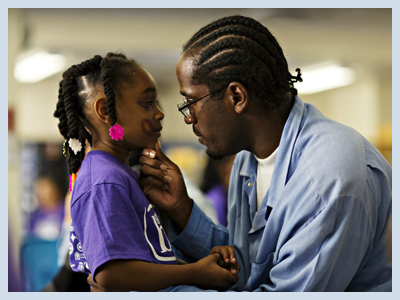Many images and words may go through your mind when you hear “incarcerated parent;” most of them having to do more with “incarcerated” than with “parent.” However, it is important to remember that although they may be in jail or prison, every incarcerated parent’s situation is different. Every incarcerated parent is more than the crime they have been charged with or convicted of, and, as Mommy or Daddy, they may be one of the most important people-if not the most important person-in the child’s life.
If you can hold your assumptions, fears, and biases lightly and get to know the parent, you will find that in many ways and in most cases they are like all parents-they care and worry about their children, they have made mistakes, they have regrets, they are multifaceted, they are diverse and every one is an individual and every family unique.
Being Open-Minded, Child-Centered, and Assessment-Oriented
The same core guiding values you bring to your work and/ or the care you provide for children in foster care and interactions with other parents of children in foster care can and should be applied to parents who are incarcerated. These include:
- Empathy & Respect
- Being non-judgmental
- Having a family-focus
- Being strengths-based
As with all the families you work with/ care for, it is important to pay attention to:
- A child and family’s sense of time
- Attachment, separation, loss and trauma
- Preserving, strengthening and building relationships
- Parent and family strengths and needs for support
Engaging Parents: Establishing a Relationship
There are significant challenges to maintaining the parent-child relationship when a parent is incarcerated-distance, time, cost of visits and phone calls, to name a few-but regardless of the permanency plan, this can be very important for the child’s well-being. Resources and programs do exist to help you navigate the criminal justice system. In addition to utilizing these, some practice tips to keep in mind when engaging parents are listed on the other side of this page.
Practice Tips
(1) Engaging parents means building a relationship with them based on respect and an assessment of the family’s needs that includes strengths and is focused on ensuring the child’s needs are met. Practice Tip:
- How would you feel if you were in the parent’s position?
- How would you want to be treated?
- Are your actions as well as your words conveying respect?
(2) Child welfare is complex and not obvious. Practice Tip:
- Be mindful of the language you use.
- Encourage parents to ask questions
- Explain terms, the process, various options, key players, and the expectations and consequences, as well as the timeframes
(3) Parents, especially those who are incarcerated, are at a disadvantage in the child welfare process-they have the most to lose, face significant stigma against them, and are limited in their ability to communicate and plan for their children. They also may be defined by their crime and their allegations, though they are more than both of these. Practice Tip:
- What do you know about this family and the parent before and beyond the allegations- seek a fuller picture (ask parents about strengths, supports, concerns, and resources).
(4) Build a network of support around every family– seek diverse perspectives and utilize available resources and expertise to assist your assessment and decision-making; this includes building a positive relationship between the parent and foster parent that could end up lasting a lifetime. Practice Tip:
- Assessing what is in a child’s best interest and how to achieve permanency is complex–collaboration and communication are keys tools in this challenging work, and building a support network around every family will safeguard children’s well-being now and in the future.
Source: Barry Chaffkin & Tanya Krupat, Coalition 2007 Conference Presentation

